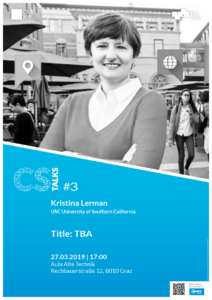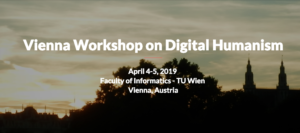
Veranstaltungen Suche und Ansichten, Navigation
Februar 2019
TEWI-Kolloquium: Developing and Evolving a DSL-Based Approach for Runtime Monitoring of Systems of Systems
Priv.-Doz. Dr. Rick Rabiser Abstract Complex software-intensive systems are often described as systems of systems (SoS) due to their heterogeneous architectural elements. As SoS behavior is often only understandable during operation, runtime monitoring is needed to detect deviations from requirements. Today, while diverse monitoring approaches exist, most do not provide what is needed to monitor SoS, e.g., support for dynamically defining and deploying diverse checks across multiple systems. In this talk, I will describe our experiences of developing, applying, and…
Erfahren Sie mehr »TEWI-Kolloquium: Random Matrix Theory in Array Signal Processing: Application Examples
Prof. Xavier Mestre Abstract: Conventional tools in array signal processing have traditionally relied on the availability of a large number of samples acquired at each sensor or array element (antenna, hydrophone, microphone, etc.). Large sample size assumptions typically guarantee the consistency of estimators, detectors, classifiers and multiple other widely used signal processing procedures. However, practical scenario and array mobility conditions, together with the need for low latency and reduced scanning times, impose strong limits on the total number of observations…
Erfahren Sie mehr »März 2019
LIT Open House
Tag der offenen Tür am LIT. Muss man einem Roboter-Kellner eigentlich Trinkgeld geben? Und haben Siri und Alexa Anspruch auf psychologische Hilfe? Die JKU arbeitet bereits jetzt an den Technologien und Herausforderungen der Zukunft. Am OPEN HOUSE Day des Linz Institute of Technology (LIT) kannst du dir selbst ein Bild davon machen, was du am LIT alles studieren kannst. Neben Informationen zu den Studienrichtungen erwartet dich Technologie zum Anfassen: vom Roboter, der Kaffee einschenkt, über Artificial Intelligence bis hin zu…
Erfahren Sie mehr »CS-Colloquium mit Dr. Hadley Wickham
Am 19.03.2019 wird Dr. Hadley Wickham der Fakultät für Informatik einen Besuch abstatten und ein CS-Colloquium zum Thema „Data Science Challenges“ halten. Dr. Hadley Wickham ist bei RStudio tätig und zudem Juniorprofessor für Statistik an der University of Auckland, Stanford University und Rice University. Er entwickelt sowohl computergestützte als auch kognitive Tools, die die Data Science einfacher, schneller und interessanter machen. Sein CS-Colloquium wird sich dem Thema „Data Science Challenges“ widmen. Dazu heißt es von Dr. Wickham vorab: „In this…
Erfahren Sie mehr »CT-Talk – Prof. Robert Elsässer
Abstract: Population protocols act in a simple and natural framework to solve fundamental problems in networks. Given a population of n anonymous nodes (also called agents), a scheduler chooses in discrete time steps two nodes for interaction, which then exchange their current states and perform a so called state transition. We focus on the random scheduler, which selects in each step two nodes uniformly at random for interaction, and on the problems of exact majority. In exact majority, initially…
Erfahren Sie mehr »CS Talk #3: Kristina Lerman
Zur Vortragsreihe CS Talks, die die zentrale Bedeutung der Informatik in unserer Gesellschaft in den Mittelpunkt stellt, werden ausschließlich Computerwissenschafterinnen eingeladen werden. Der dritter Termin findet am 27. März 2019 um 17 Uhr in der Aula Alte Technik der TU Graz statt. Die Vortragende beim CS Talk #3 ist Kristina Lerman von der USC University of Southern California sprechen. Der nächste CS Talk findet am 17.Juni 2019 statt.
Erfahren Sie mehr »April 2019
Vienna Workshop on Digital Humanism
Wir befinden uns auf einer Reise, die zu einer weiteren industriellen Revolution führt: die Digitalisierung aller Daten und die Automatisierung von Arbeit und Denken. Dies hat Auswirkungen auf alle Lebensbereiche, Arbeit, Freizeit, Politik, das Persönliche, das Berufliche und das Private. Diese Entwicklung eröffnet zwar enorme Möglichkeiten für unsere Zukunft, wirft aber auch ernste Fragen In diesem Kontext ist der Vienna Workshop in Digital Humanism angesiedelt, der am 4. und 5. April in den neuen Räumlichkeiten der TU Wien in der…
Erfahren Sie mehr »Knitting together/Living together: Was wir vom Stricken mit Robotern lernen können
Dr. Pat Treusch Inhalt (Entwurf): In ihrem Vortrag "Knitting together/Living together: Was wir vom Stricken mit Robotern lernen können“ spricht Patricia Treusch über die Zusammenarbeit von Mensch und Maschine. Aufbauend auf ihrer aktuellen Forschung beleuchtet sie Mensch-Maschine-Verhältnisse, Automatisierung von Arbeit sowie den Körper/Geist Split im Zusammenhang mit Artificial Intelligence. Am Beispiel Stricken diskutiert sie die Interaktionsverhältnisse zwischen Mensch und Roboter und stellt Formen der feministischen-kritischen Intervention in aktuelle Praktiken des Engineering und der Robotik vor. © Felix Noak Dr. phil./PhD Pat Treusch hat am…
Erfahren Sie mehr »Mai 2019
Use, Misuse, and Reuse of Continuous Integration Features
Prof. Shane McIntosh Abstract: Continuous Integration (CI) is a popular practice where software systems are automatically compiled and tested as changes appear in the version control system of a project. Like other software artifacts, CI specifications, which describe the CI process, require maintenance effort. In this talk, I will describe the results of an empirical analysis of patterns of feature use and misuse in the Travis CI specifications of 9,312 open source systems. To help developers to detect and remove…
Erfahren Sie mehr »TEWI-Kolloquium: A Survey of Evaluation Techniques and Systems for Answer Set Programming
Prof. Francesco Ricca Abstract: Answer set programming (ASP) is a prominent knowledge representation and reasoning paradigm that found both industrial and scientific applications. The success of ASP is due to the combination of two factors: a rich modeling language and the availability of efficient ASP implementations. In this talk we trace the history of ASP systems, describing the key evaluation techniques and their implementation in actual tools. CV: Francesco Ricca (www.mat.unical.it/ricca) is currently an Associate Professor at the Department of…
Erfahren Sie mehr »


